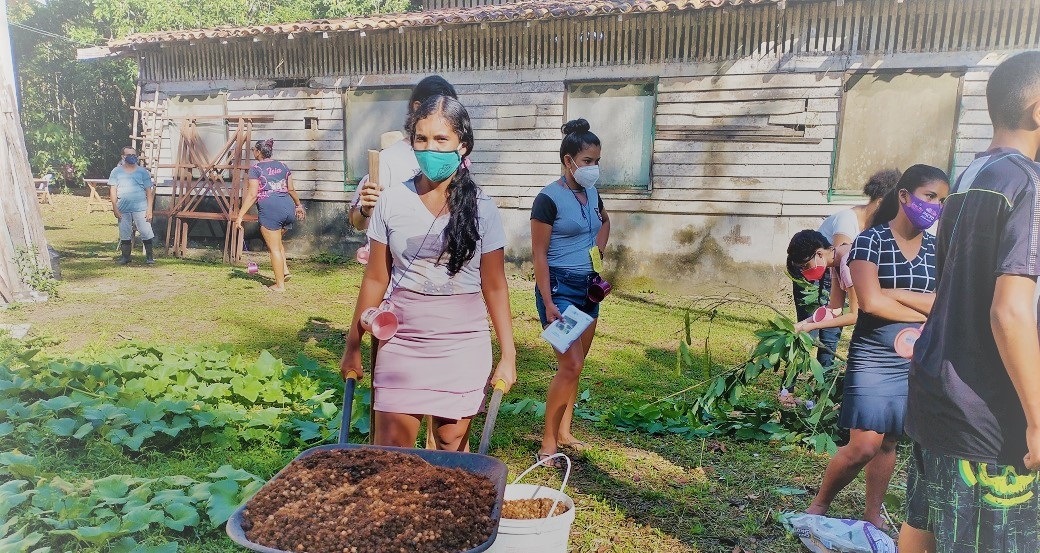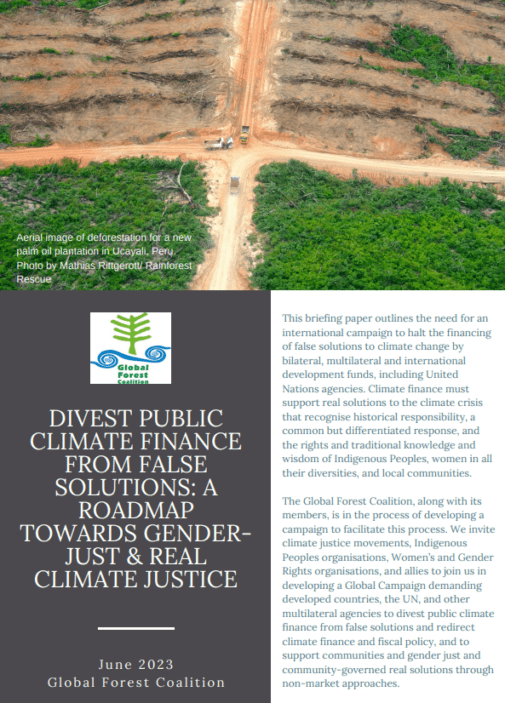Media Release: Urgent action required to halt the gender, environmental and human rights impacts of China’s Belt and Road Initiative
Urgent action required to halt the gender, environmental and human rights impacts of China’s Belt and Road Initiative
New GFC report exposes troubling consequences of China-backed infrastructure projects in Kenya, Indonesia, and Argentina
(UTRECHT, 26 September 2023) – China-backed global infrastructure projects are imposing human rights violations and environmental destruction across the Global South, with specific impact on Indigenous Peoples and women in all their diversities, the Global Forest Coalition (GFC) said today.
In a new 16-page report Debt, Displacement, and Biodiversity Loss: Assessing the Gender, Environmental, and Human Rights Implications of China’s Belt and Road Initiative, GFC uncovers the deeply troubling consequences of China-backed infrastructure projects in Kenya, Indonesia, and Argentina. With a focus on the diverse experiences of women, the report unveils the human rights violations and environmental devastation resulting from China’s ambitious Belt and Road Initiative (BRI).
“The Belt and Road Initiative’s disregard for women’s rights is a stark reminder of the urgent need for change. It’s time to dismantle the unequal power structures that perpetuate these violations,” says Allie Constantine, the report’s author. “We’re seeing the same issues across the board; from Latin America to Africa to Asia. China, host countries and financial backers of these projects are liable for their destructive consequences. Time and resources must urgently be put into assessing the gender, environmental and human rights impacts of these projects and taking the necessary steps to mitigate and avoid these harms before they take place.”
The BRI projects examined in Kenya, Indonesia, and Argentina expose a grim reality of unequal power dynamics, exacerbating gender disparities and violations of the rights of women in all their diversities. The research uncovers instances of forced displacement, gender-based violence, and other rights violations, particularly against Indigenous People and Local Communities. It also reveals the limited access to economic opportunities for women, inadequate consultation processes, and insufficient safeguards during project planning and execution. Discriminatory practices and a lack of gender-responsive policies further marginalise women, especially those from vulnerable and marginalised communities, GFC said.
The BRI projects have also caused widespread ecological damage, including deforestation, human and animal habitat destruction, water pollution, and increased carbon emissions. These consequences have far-reaching implications for local communities, biodiversity, and the global climate. Women, who play a pivotal role in natural resource management and household well-being, bear a disproportionate burden from environmental degradation.
“The environmental havoc unleashed by the Belt and Road Initiative threatens the very ecosystems we rely on. It’s high time we prioritise development and environmental stewardship,” said Kwami Kpondzo, GFC Extractive Industries, Tourism and Infrastructure Campaign Coordinator. “Emphasising the rights of Indigenous Peoples and women in all their diversities will contribute to more sustainable and inclusive development outcomes. We urgently need proper and adequate participation and consultation of impacted communities, as well as monitoring of project compliance and effective legal frameworks and international enforcement mechanisms.”
The report underscores the inextricable link between human rights and environmental concerns. It calls for a gender-responsive and rights-based approach in BRI project planning, emphasising the need to engage women and diverse stakeholders in decision-making processes, conduct gender and environmental impact assessments, and promote sustainable livelihoods.
The report’s policy recommendations provide a roadmap for change calling for enhanced coordination and cooperation among stakeholders, including Chinese and host country governments, civil society organisations, and international institutions. Integration of gender justice, human rights, and environmental protection principles into the BRI framework and project-specific guidelines are imperative to ensure a just path forward for these ambitious projects, GFC said. Furthermore, capacity-building initiatives, knowledge-sharing, and monitoring mechanisms are vital to implement recommendations effectively.
This comprehensive report serves as a wake-up call, demanding a holistic and inclusive approach to mitigate the negative consequences of China’s Belt and Road Initiative. By heeding the proposed policy recommendations, stakeholders can work together to ensure that BRI projects contribute to sustainable development, gender justice, and the protection of human rights and the environment.
To access the full report, please click here.
For media inquiries, please contact:
Ismail Wolff
ismail.wolff@globalforestcoalition.org
About the Global Forest Coalition:
The Global Forest Coalition is a worldwide network of NGOs and Indigenous Peoples’ Organizations advocating for the conservation, restoration, and sustainable use of forests. With a commitment to gender and environmental justice, GFC works to protect the rights of Indigenous Peoples and Local Communities while addressing the root causes of deforestation and biodiversity loss.








